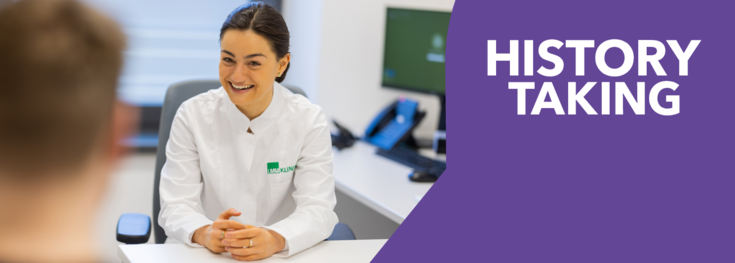International cooperation to teach practical skills

Aim
In 70–80% of cases, a diagnosis can be arrived at from the medical history if it is taken correctly, and possibly painful and costly tests are avoided. Learning how to filter important facts from the patient's narrative requires a great deal of practice. This course will teach you how to get there.
Innovative, international teaching formats
“At times, the pandemic made global dialogue very difficult. But at the same time, it opened up new possibilities,” says program leader Professor Orsolya Genzel-Boroviczény. After having to move many events onto the Internet during the lockdown, she had the idea of a virtual course on the subject of ‘History Taking’. That course is now being organized worldwide together with partner universities in Bari, Italy, and St. Louis, USA. The international exchange students at LMU can earn credit points if they pass a non-obligatory short exam at the end of the program.
The course looks at specific ways to take down patients’ medical histories. “It is difficult to teach physical examinations online,” Professor Genzel-Boroviczény admits. “But for budding doctors, communication is just as essential as technical skills in the operating theater. And we also benefit here from the international community.”
Intercultural communication in the operating theater
The course addresses standard questions that are important when diagnosing an illness, for example. But it also tackles the difficulties that must be overcome when asking about the patient’s history. Special characteristics of children and young people are explored, as are gender-specific questions and racist thought patterns that could hinder a correct diagnosis. The focus is also on intercultural communication: After all, how patients deal with different health-related topics and how they respond to sensitive questions varies all over the world. Innovative teaching formats such as the ‘History Taking’ course broaden the spectrum of offerings that cultivate dialogue between medical students.
“Not everyone can go abroad while a student,” Genzel-Boroviczény says. “This makes it even more rewarding that there are now new opportunities to sign up for international courses despite that and to learn from colleagues from all over the world.”
Content
So that students around the world and from the international universities involved can participate, training and communication workshops take place in late afternoon, Central European Time, throughout the summer semester.
The following subjects from various specialist disciplines form the basis for this and offer an opportunity for practice:
- Introduction and general history taking
- How to present a patient
- Leading symptoms
- Chest pain
- Neurology – what if the brain fails?
- Pediatric and adolescent medicine: "My child is sick", "My parents dragged me here"
- Questions we don’t want to ask: Obtaining a sexual history, History taking for haemorrhoids
- Joints and Skeleton
- Gynecology
-
Skin complaints: rashes, itches, spots
Medicine and Culture
Medicine does not happen in a vacuum but rather integrated into society in general. It thus reflects society in both its strengths and weaknesses. In this lecture, we will review how different cultures view the same pathology, how some cultures seem to invent pathologies, what diversity means for medical caregivers and evidence for structural racism in medicine. This lecture does not offer solutions but rather presents data and information that can form the foundation for reflection and discussion which may lead to insightful medical care in increasing global societies.
Workshops
- Overcoming cultural and linguistic barriers in patient interactions
- How to give feedback
- How to efficiently communicate with other physicians
Simulation game (will, unfortunately, not take place during 2024's History Taking. We are terribly sorry for the inconvenience!)
(The simulation game is a role-playing game between the students from all the universities participating.
In the context of a game, the students are expected to act as a team and deal with patient cases. They not only play the role of doctors, but also of the patients, their family, nurses and observers. The roles are allocated at random by drawing lots in advance.
The students will spend time together in two meetings in a virtual emergency department specifically tailored to the game. The aim of the first meeting is to practice talking through medical histories, time management, and presenting patient cases to the group. In the second simulation game the focus is on Breaking Bad News and conducting difficult conversations. Both simulations involve practicing constructive feedback and error management. The game is intended to provide the students with a protected space in which to try things out, to reflect on mistakes where applicable and, as future doctors, to develop a better empathy for future patients, their families and colleagues in interprofessional teams.)
History taking in the host country´s language
One part of the course involves peer teaching and gives students a chance to improve their language skills and to develop intercultural awareness.
Students will be paired to practice in their exchange country´s language. For example an Italian student with a German student. The "patient" speaks his/her native language, the "physician" the patient´s language. This is excellent preparation for Erasmus Students for their actual stay in the other country.
This course is also a preparation for the USMLE (United States Medical Licensing Exam) Step 1 to 3, where history taking is an important part.
Course dates 2024
Wednesdays, 5 pm Munich time, around 90 minutes
(times may vary for one or the other session, will be communicated in advance)
May 15 –July 17
ECTS credits
3 (Only if participants pass a non-obligatory, short, short exam at the end of the program. Otherwise, only a participation certificate will be issued, if participants were present throughout the program.)
Application
All students need to apply no later than May 5, 2024 using the LMU Application Service.
Documents to be submitted:
- CV
- Most recent official Transcript of Records
Students from Munich, Bari and St. Louis have priority for admission.

